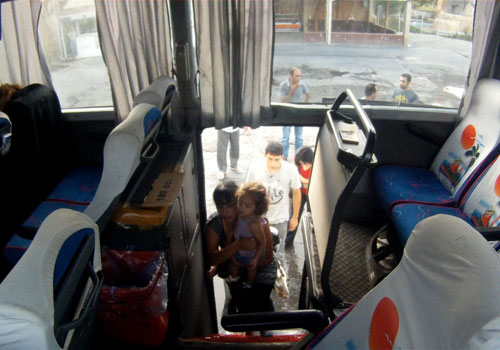“44 passengers, 36 hours, one big family… Turkey and Armenia… Two closed countries. Two distant neighbors. Throughout history, those two nations have shared the same land. Nowadays, those two nations, though living side by side, ignore each other,” said Aris Nalci, the filmmaker and project coordinator of a new documentary project that traces the lives and stories of the passengers and drivers of buses that travel between Yerevan and Istanbul each week. Because of the closed border between the two countries, a one-way trip takes 36 hours and goes through Georgia.
“The main objective of the project is to shed some light on the challenges faced by the Armenian immigrants that come to Turkey through Georgia and to raise awareness about the problems related specifically to the journey between Turkey and Armenia,” said the filmmaker.
The film, “Bus: A Mobility Reporting Project,” will be screened in Istanbul, Yerevan, Belgium and perhaps also in France. The team behind the project has also submitted the film to several festivals with the aim of attracting a broader audience. After it does the film festival circuit, the film will be broadcast on Turkish television. There are also plans to organize photography exhibits in Istanbul and Gyumri of the photos taken on the trip.
Speaking to Epress.am, Nalci describes the story of one couple on the bus and in the film: “A nurse originally from Armenia, Anahid, and an Iranian labourer, Halil, met two years ago in Turkey. Anahid migrated to Turkey to look for work, and it’s been 6 years that she’s been living in Turkey and working as a nurse, so that her children can study in Armenia. She takes care of the elderly by staying with them overnight and helping them the best way she can. As a cheap labourer, she does the work that others refuse to do, but she doesn’t complain. Her daughter is now expecting a child, which is why Anahid was coming to Armenia, to see her daughter.
“Halil’s story is totally different. He is Christian Iranian. He was the first one to get on the bus. He took seat No. 19 and each passenger that passed him looked closely at what he was reading. We too were dumbstruck. We thought he was reading the Koran in a bus going to Armenia. But no, actually he was reading the Bible in Farsi.
“Halil wanted to tell us his story but was afraid. Being Christian in Iran, he tells us that he ran away from Ahmadinejad’s regime.
“’To be Christian in Iran is only official for one minority group: the Armenians. If you are Iranian and not Muslim you are more mistreated than the member of a minority group,’ he told us. By fleeing the regime in Iran, he left his children behind him. They became Muslim but Halil couldn’t convert. He didn’t want to convert. During the entire trip he didn’t put down his Bible.”
Described in the film are the stories of other passengers, mainly people who are forced to take the long and tedious trip by bus since they are unable to afford the more expensive airfare. If the border between Armenia and Turkey was open, this same trip would be reduced by 2.5 times.
“Bus: A Mobility Reporting Project” was produced through the USAID-funded Support to Armenia-Turkey Rapprochement project implemented by the Consortium, which includes Eurasia Partnership Foundation, Union of Manufacturers and Businessmen of Armenia, International Center for Human Development and Yerevan Press Club.
 Epress.am News from Armenia
Epress.am News from Armenia

